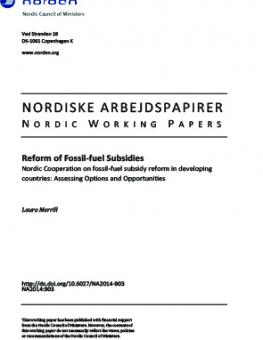
Reform of Fossil-fuel Subsidies—Nordic Cooperation on fossil-fuel subsidy reform in developing countries: Assessing options and opportunities
Fossil-fuel subsidies matter.
They matter for sustainable development; they matter for government budgets; they matter for the poor who benefit very little; they matter for women and accessing daily necessities such as heating, lighting, cooking and transport; and they matter for the environment in that they work in the opposite direction of a low-carbon future, impede renewable take-off, stifle energy efficiency and dwarf climate finance. Global pre-tax subsidies amounted to US$480 billion in 2011, whilst post-tax subsidies reached US$1.9 trillion. Reforming and redirecting subsidies will be an important piece of the jigsaw if we are to solve the climate change puzzle.
This report, produced by IISD-GSI provides input to the Nordic Council of Ministers by identifying options and opportunities for increased Nordic cooperation on the phasing out of fossil-fuel subsidies in developing countries. The research explores existing Nordic cooperation efforts in the fields of energy, climate change and extractives, outlines Nordic development trends and priorities, proposes partner countries, identifies potential areas of cooperation, and presents four recommendations for future action. Savings enable governments to manage deficits—they can be redirected at building sustainable energy networks or targeted at social spending.
You might also be interested in
The Cost of Fossil Fuel Reliance
Government support for fossil fuels reached at least USD 1.5 trillion in 2023, new data shows.
Increased Support Needed to Achieve India's Clean Energy Goals
India is on track to achieve many of its 2030 clean energy goals but needs to step up government support measures to accelerate the deployment of offshore wind, electric vehicles, and green hydrogen, according to a new report.
Ending Export Credits for Oil and Gas: How OECD countries can end 2024 with a climate win
For a year now, Organisation of Petroleum Exporting Countries (OECD) governments have been negotiating an agreement that could put an end to oil and gas export finance. Following the acrimony in Baku, this would be a very real way for the OECD to show policy coherence, respond to calls from the poorest countries to stop subsidizing fossil fuels, and shift public finance to solutions.
Fossil Fuel Production, Renewable Energy, and Subsidy Reform in Nationally Determined Contributions 3.0
This policy brief provides an analysis of the critical benchmarks and recommendations necessary for aligning nationally determined contributions (NDCs) with the 1.5 °C target.